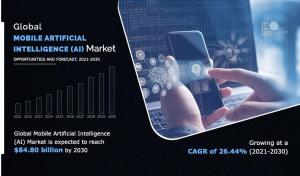Mobile Artificial Intelligence (AI) Market Set to Surge Significantly During 2030
Mobile Artificial Intelligence (AI) Market Expected to Reach $84.80 Billion by 2030
Download Research Report Sample & TOC: https://www.alliedmarketresearch.com/request-sample/A13133
The emergence of edge-AI technology allows moving many of the backend profiling AI capabilities to the phone itself. Smartphones with an AI combo are one of the biggest trends in the market today. AI has several uses on a handheld device, though the benefits are limited initially. Several mobile manufacturing companies are competing to develop AI features for smartphones according to the needs of the users. For instance, Apple, Samsung, and Huawei have introduced smartphones with powerful AI chips that can perform up to 5 trillion operations per second and use significantly less power to accomplish tasks. With AI, these phones provide features from Face ID to augmented reality.
Artificial Intelligence (AI) forms a key part of the engine behind the continued advancement of extended reality (XR). The AI technology gives mobile devices the ability to process and understand the 3D world, providing the platform for more engaging XR services. Also, with enhanced visual detection capability, an AI-powered camera enables smartphones to offer more enriching photography experiences, empowering users to capture their vision. In addition, AI technology is even used to improve photo quality, with an AI recognition of depth that enables digital image post-production editing of blur and sharpness. As the smartphone market shifts from selling technology products to delivering compelling and personalized experiences, AI solutions running on smartphones will become an essential part of vendor roadmaps over the next two years.
The prominent factors that impact the mobile artificial intelligence (AI) market growth are the High demand for Artificial Intelligence in smartphones, growing demand for AI-capable processors, and rising investment in Artificial Intelligence (AI) technologies. However, High pricing of artificial processors restricts the market growth. On the contrary, the emergence of edge computing is expected to create lucrative opportunities for the market. Therefore, these factors are expected to affect mobile artificial intelligence (AI) market growth during the forecast period.
Get Customized Reports with you’re Requirements: https://www.alliedmarketresearch.com/request-for-customization/A13133
Competitive Analysis:
The Mobile Artificial Intelligence (AI) industry's key market players adopt various strategies such as product launch, product development, collaboration, partnership, and agreements to influence the market. It includes details about the key players in the market's strengths, product portfolio, market size and share analysis, operational results, and market positioning.
Some of the major key players in the global Mobile Artificial Intelligence (AI) Market include,
INTEL CORPORATION
Samsung Electronics
Qualcomm Technologies, Inc.
MICROSOFT CORPORATION
MEDIATEK, INC.
Huawei Technologies Co., Ltd. (Huawei)
Apple Inc.
International Business Machines Corporation (IBM)
NVIDIA CORPORATION
Google LLC (Alphabet Inc.)
The global mobile artificial intelligence (AI) market share is segmented based on technology node, component, application, and region. By technology node, the market is classified into 20–28nm, 10nm, 7nm, and others. By component, it is divided into hardware, software, and services. Based on hardware, the market is sub-segmented into processor, memory, sensor, and others. Depending on the application, it is separated into smartphones, cameras, drones, automotive, robotics, AR/VR, and others.
Region-wise, the mobile artificial intelligence (AI) market trends are analyzed across North America (U.S., Canada, and Mexico), Europe (Germany, UK, France, Italy, and Rest of Europe), Asia-Pacific (China, Japan, India, South Korea, Taiwan, and Rest of Asia-Pacific), and LAMEA (Latin America, the Middle East, and Africa). North America region is projected to have the most significant increase in demand, as it provides a suitable environment for startups and SMEs, in terms of government regulations and compliance. The overall mobile artificial intelligence (AI) market analysis is determined to understand the profitable trends to gain a stronger foothold.
The COVID-19 outbreak has positively as well as negatively affected major businesses worldwide by disrupting production cycles and supply chains across industries. The smartphone industry has faced some challenges in eradicating the pandemic, as the number of infections shows no signs of subsiding. Half of the world is currently facing a second wave of the pandemic.
The slowdown in production by OEMs and the reduction in demand for mobile devices and other electronic devices have slightly pulled down the market for mobile artificial intelligence (AI). However, as vaccines roll out across the globe and the pandemic situation is better controlled, especially in North America and Europe. This would boost the recovery of growth for the mobile artificial intelligence (AI) market revenue.
Inquiry before Buying: https://www.alliedmarketresearch.com/purchase-enquiry/A13133
Key Findings Of The Study
- In 2020, the 20–28nm segment accounted for the maximum revenue and is projected to grow at a notable CAGR of 30.81% during the forecast period.
- The smartphone segment accounted for more than 35% of the global market share in 2020.
- The robotics segment witnessed the highest growth rate during the forecast period.
- The UK was the major shareholder in the European mobile artificial intelligence (AI) market revenue, accounting for approximately 26% revenue in 2020.
About Us:
Allied Market Research is a top provider of market intelligence that offers reports from leading technology publishers. Our in-depth market assessments in our research reports consider significant technological advancements in the sector. In addition to other areas of expertise, AMR focuses on analyzing high-tech and advanced production systems. We have a team of experts who compile thorough research reports and actively advise leading businesses to enhance their current procedures. Our experts have a wealth of knowledge on the topics they cover. Also, they use a variety of tools and techniques when gathering and analyzing data, including patented data sources.
David Correa
Allied Market Research
+ + 1 800-792-5285
email us here
Visit us on social media:
LinkedIn
Facebook
YouTube
X
Legal Disclaimer:
EIN Presswire provides this news content "as is" without warranty of any kind. We do not accept any responsibility or liability for the accuracy, content, images, videos, licenses, completeness, legality, or reliability of the information contained in this article. If you have any complaints or copyright issues related to this article, kindly contact the author above.
Reliable Transportation Association Launches Lloyd’s Backed Physical Damage Program for Commercial Auto
Taiwan Postbiotic Food Supplement Market Drivers, Key Players & Opportunities 2024–2027
Interleave Paper Evolves with Food Safety, Automation, and Anti-Static Tech in Global Industrial Packaging Systems
Więcej ważnych informacji
 Jedynka Newserii
Jedynka Newserii

 Jedynka Newserii
Jedynka Newserii

Handel

1 października ruszy w Polsce system kaucyjny. Część sieci handlowych może nie zdążyć z przygotowaniami przed tym terminem
Producenci, sklepy i operatorzy systemu kaucyjnego mają niespełna dwa miesiące na finalizację przygotowań do jego startu. Wówczas na rynku pojawią się napoje w specjalnie oznakowanych opakowaniach, a jednostki handlu powinny być gotowe na ich odbieranie. Część z nich jest już do tego przygotowana, część ostrzega przed ewentualnymi opóźnieniami. Jednym z ważniejszych aspektów przygotowań na te dwa miesiące jest uregulowanie współpracy między operatorami, których będzie siedmiu, co oznacza de facto siedem różnych systemów kaucyjnych.
Ochrona środowiska
KE proponuje nowy cel klimatyczny. Według europosłów wydaje się niemożliwy do realizacji

Komisja Europejska zaproponowała zmianę unijnego prawa o klimacie, wskazując nowy cel klimatyczny na 2040 roku, czyli redukcję emisji gazów cieplarnianych o 90 proc. w porównaniu do 1990 rok. Jesienią odniosą się do tego kraje członkowskie i Parlament Europejski, ale już dziś słychać wiele negatywnych głosów. Zdaniem polskich europarlamentarzystów już dotychczas ustanowione cele nie zostaną osiągnięte, a europejska gospodarka i jej konkurencyjność ucierpi na dążeniu do ich realizacji względem m.in. Stanów Zjednoczonych czy Chin.
Handel
Amerykańskie indeksy mają za sobą kolejny wzrostowy miesiąc. Druga połowa roku na rynkach akcji może być nerwowa

Lipiec zazwyczaj jest pozytywnym miesiącem na rynkach akcji i tegoroczny nie był wyjątkiem. Amerykańskie indeksy zakończyły go na plusie, podobnie jak większość europejskich. Rynki Starego Kontynentu nie przyciągają jednak już kapitału z taką intensywnością jak w pierwszej części roku. Z drugiej strony wyceny za oceanem po kolejnych rekordach są już bardzo wysokie, a wpływ nowego porządku celnego narzuconego przez Donalda Trumpa – na razie trudny do przewidzenia. W najbliższym czasie na rynkach można się spodziewać jeszcze większej zmienności i nerwowości, ale dopóki spółki pokazują dobre wyniki, przesłanek do zmiany trendu na spadkowy nie ma.
Partner serwisu
Szkolenia

Akademia Newserii
Akademia Newserii to projekt, w ramach którego najlepsi polscy dziennikarze biznesowi, giełdowi oraz lifestylowi, a także szkoleniowcy z wieloletnim doświadczeniem dzielą się swoją wiedzą nt. pracy z mediami.



![Nestlé w Polsce podsumowuje wpływ na krajową gospodarkę. Firma wygenerowała 0,6 proc. polskiego PKB [DEPESZA]](https://www.newseria.pl/files/1097841585/fabryka-nesquik_1,w_85,r_png,_small.png)




.gif)

 |
| |
| |
|